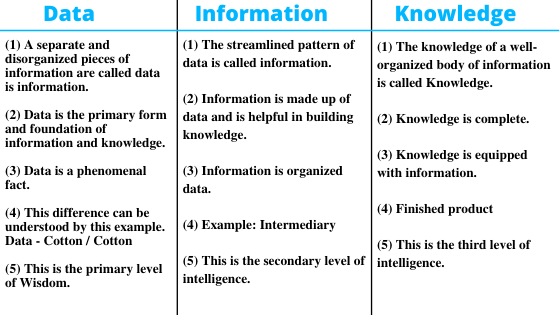What are Data, Information, and Knowledge | Explain the Relation or Deferences | Explain the Relation or Deferences between Data, Information, and Knowledge
In the present era, the term "information" has become quite important as a
result of the increasing influence of information and technology. Today,
information is considered a source of resources and power.
The word 'information' is treated in various
contexts such as it are taken as a synonym of data, knowledge, etc.
In fact, the
meaning of the word information is different from other words like data, facts,
and knowledge. In fact, there is a very subtle difference between data (data),
information, and knowledge.
To
understand the difference between data, information, and knowledge, it is
essential to understanding data, information, and knowledge separately:
What is Data?
Data
can be interpreted in such a way that the place or other is evaluated by means
of letters or numbers.
"The
term data indicates fact-specific, statistical information, and piece of
information."
Thus
isolated pieces of information are called data. For example, the person's name,
work, age, salary, etc. are fact data that provides information about that /
person.
What is Information
Data is divided into separate sections, together and form information in an
organized way.
The definition of information " The the knowledge received by the word or in writing from news or news, facts or
figures or instruction is called the information".
"Information
is defined as the knowledge conveyed or received about a fact or situation,
knowledge about research or instruction."
Information
is defined by UNESCO as "information is made up of symbolic words and conveys
absolute and technical knowledge no matter the nature and form of presentation
of these symbols."
What is Knowledge
Knowledge is a vast form of data and information. The definition of knowledge
can be given as "sense or understanding acquired from a well-organized
body of information or facts"'
For example,
when we say that it is necessary to have knowledge of such language, it means
that a person having knowledge of facts and information of that language, who
has knowledge of that language, is suitable for it.
In this way
data, information, and knowledge can be understood easily.
Difference or interrelationship in data, information, and knowledge
Data and knowledge
From the above study of knowledge, we can see the difference between data,
information, and knowledge in this way.
 |
| Data, Information, and Knowledge |
Define Data
(1) A
separate and disorganized pieces of information are called data is information.
(2) Data is
the primary form and foundation of information and knowledge.
(3) Data is
a phenomenal fact.
(4) This difference can be understood by this example. Data - Cotton / Cotton
(5) This is
the primary level of Wisdom.
Define Information
(1) The streamlined pattern of data is called information.
(2)
Information is made up of data and is helpful in building knowledge.
(3)
Information is organized data.
(4) Example:
Intermediary
(5) This is
the secondary level of intelligence.
Define Knowledge
(1) The
knowledge of a well-organized body of information is called Knowledge.
(2)
Knowledge is complete.
(3)
Knowledge is equipped with information.
(4) Finished
product
(5) This is
the third level of intelligence.
In this way,
the difference between data, information, and knowledge can be understood. Data
are first woven as information. Which is used to construct a streamlined part
of knowledge?
Generally,
both data and information are the building blocks of knowledge and all three
are related to each other. Therefore, generally, the difference between data,
information, and knowledge is not known.
Use of data, information, and knowledge by library and information centers in the library and information services
There is no
need to distinguish between data, information, and knowledge for services
provided by the library and information centers.
Generally,
all three are used for different types of services in libraries. Because many
users consider data, facts, and knowledge as information only.
For example,
population data enables the nation's population to be assessed, it is
statistical data and it is information for the researcher to get information
about this subject from which he can gain knowledge.
In this way,
the user likes to study the system of data and its articles. If the reader
wants quick knowledge of the population, then the article will be more useful
than statistics. The article is more capable of providing the necessary
information than statistical tables.
All three
use data, information, and knowledge by the library and information centers for
its users.
For example,
data on national income is presented by the library and information center,
which helps an economist in estimating national income, besides information
documents are presented on the basis of those data in the form of information
by information centers. is.
After
summarizing and organizing the data, it turns into useful information. And the
study comes as a basis for research work.
In this way,
information on a subject is systematically presented by the library and
information center. In this way, information and knowledge are used by
libraries through various types of services.
Conclusion:
Generally, data, information, and knowledge are considered to be the same by
the users and all three consider the information provided by the library. All
three are related to each other.
But we
should clearly understand the difference in it from a commercial point of view
and keep a more clear view of the usage and behavior of these words.
Because
knowing the difference between the three bits of help in providing information
services to meet the diverse information requirements of different types of
users.
To Know More About Library Science Click on the Link Given Below
| ||
1. Library and Society
| ||
2. Library Management
| ||
3. Library Cataloging
| ||
4. Library Classification
| ||
5. Information Source
| ||
6. MCQs on Library Science
| ||
8. Jobs in Library Science
| ||
Join Library Science Group for Latest Updates
| ||


Post a Comment